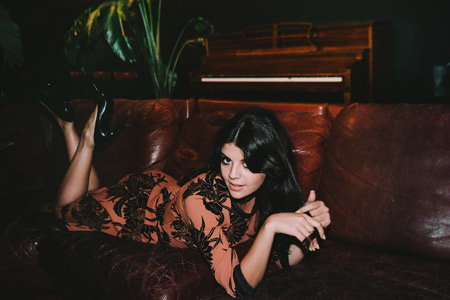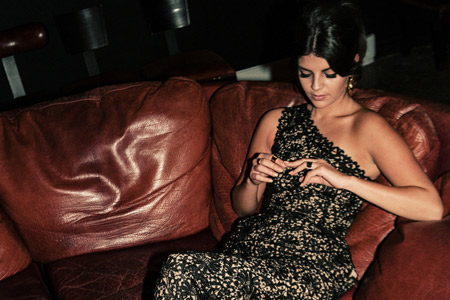“Take the A Train” Somewhere Blue
by Natasha Wolff | October 7, 2014 3:26 pm
Nikki Yanofsky doesn’t miss a beat. Maybe the 20-year-old Canadian jazz-pop ingénue, who has sounded like Ella Fitzgerald incarnate since she was 13, has just been improvising the standards long enough for the skill to translate to conversation. Regardless, she’s so sure of herself, and so quick on the draw, that it’s impossible not to take her word for it (whatever “it” might be). Her bold quickness may also remind you that you’re taking the word of someone very young, but her drive will help you forgive her overstated certitudes.
Today Nikki’s second solo record, Little Secret[1], debuts in the U.S. Produced by Quincy Jones, it is her first full album of original songs, and based on the remarkable catchiness of its first two singles, “Something New” and “Necessary Evil,” it’s safe to say you’re about to be hearing a lot more of her this year. She is arguably one of the most talented acts in the tradition of Amy Winehouse since Amy herself, who was Nikki’s contemporary musical idol—signature cat eye and all.

Nikki Yanofsky
I must admit it’s somewhat disconcerting to see this wholesome, polite, self-possessed girl-child scatting in the footsteps of Amy Winehouse, who was, in essence, anything but any of the above. No one is remembering Amy’s self-destructive antics through rose-colored glasses, but it’s interesting that Amy’s wildness, which somehow seemed a fated accompaniment to her jazz heritage and genius, is so far from Nikki’s perception of jazz as “classic”—a word which seems in her eyes tantamount to “classy.” As she says, “Classic is definitely a word I would use to describe my sound, my look and kind of everything I do. That’s one of the reasons I love jazz so much—it’s timeless, and it has a romance about it that doesn’t exist nowadays.”
Nikki says her parents are her best friends, and that in her spare time she mostly likes to write songs in her basement. “I know it’s a really boring answer, because it’s like, what do you do when you’re not doing music? Music! I just kind of live and breathe it, and I can’t turn it off.” She considers Miley Cyrus and Lorde to be “counterculture,” and prefers Lorde to Miley because “she’s more covered and all that, which I respect.” She loves her two older brothers and ponders, “I don’t know that I’d want to have a sister. I just feel like I’m constantly protected with my brothers; they look out for me.” A self-purported perfectionist, Nikki works out devotedly, watches what she eats and loves it when it rains because it makes her feel calm.

Nikki Yanofsky
There’s no doubt that in Nikki Yanofsky, jazz and blues lovers everywhere have been given a spectacular gift in a very strange package. Yes, it’s jarring to see a tiny, underage Canadian white girl in a jazz club bringing home “Take the A Train,” but when you hear it—it is truly as if Ella is in the room. Yes, Nikki is incredibly young and idealistic and seems to be wholly absent of the grit and ripened anguish implicit in the genre of music she considers “romantic”… but, I’m going to say—so what. She’s massively talented, and must be one of the most clearly focused and driven artists I’ve ever met.
If I’ve seemed resistant, my resistance is really just about a gut-instinct fear of manufactured soulfulness. I think that our culture’s recent fixation on appropriation—who gets to sing what, say what, imitate what—only goes as far as the preoccupation of whoever is resenting the inauthenticity. It is a choice to value authenticity—whether comprised of an individual’s life experiences, or ethnic or cultural heritage—above the talent or capabilities of that individual. Maybe it’s a moot point here anyway. My guess is that not many people today would even consider using jazz to be a risky cultural appropriation. The genre has been around long enough that it may be, as Nikki says, “classic.”
In the end, I think my hesitance isn’t about the musical tradition she will draw from as much as it is the weighty lineage of female vocalists she’s likely to join by the merit of her skill. Ella, Etta, Billie, Nina, Amy, even Adele. Long-suffering, hearts bound up in barbed wire—these are women whose voices and stories have galvanized and comforted countless other women for decades. I do believe that Nikki has the restlessness. Her voice has the timelessness. I just wonder if she has the darkness. It isn’t a nice thing to wish on someone at 20 years of age, but then again, maybe it is.
- Little Secret: https://itunes.apple.com/ca/album/little-secret/id852621807
Source URL: https://dujour.com/culture/nikki-yanofsky-little-secret-interview/